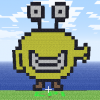#include <iostream>
#include <typeinfo>
using namespace std;
class Shape { public: virtual ~Shape() {}; };
class Circle : public Shape {};
class Square : public Shape {};
class Other {};
int main() {
Circle c;
Shape* s = &c; // Upcast: normal and OK
// More explicit but unnecessary:
s = static_cast<Shape*>(&c);
// (Since upcasting is such a safe and common
// operation, the cast becomes cluttering)
Circle* cp = 0;
Square* sp = 0;
// Static Navigation of class hierarchies
// requires extra type information:
if(typeid(s) == typeid(cp)) // C++ RTTI
cp = static_cast<Circle*>(s);
if(typeid(s) == typeid(sp))
sp = static_cast<Square*>(s);
if(cp != 0)
cout << "It's a circle!" << endl;
if(sp != 0)
cout << "It's a square!" << endl;
// Static navigation is ONLY an efficiency hack;
// dynamic_cast is always safer. However:
// Other* op = static_cast<Other*>(s);
// Conveniently gives an error message, while
Other* op2 = (Other*)s;
// does not
I copy pasted the code from a book's source,yet I see nothing writen in the console! Why is that?








